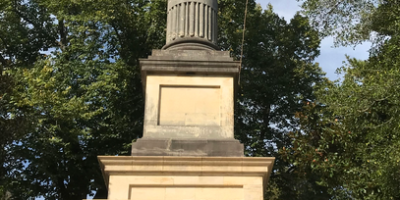Remembering Howard Zinn
By Michael Benton and Michael Marchman
The news that historian, author, playwright, and activist Howard Zinn died on January 27 of this year hit us hard. Zinn, as much as anyone in our lives, revolutionized how we understand our history, ourselves, and, our roles as educators. “In a world where justice is maldistributed,” he wrote, “there is no such thing as a neutral or representative recapitulation of the facts.” We agree. There is tremendous injustice in the world and as educators we feel a deep responsibility to our students, our community, and ultimately to ourselves, to acknowledge these injustices, to seek explanations for them, and to challenge them.
Zinn provided a model for us, urging us to encourage our students to be active participants in democracy rather than passive spectators. And he showed us how to do it.
Teaching with these goals means taking sides. As educators, we believe that neutrality is not only impossible, it is undesirable. We do not believe that teachers should ignore alternative perspectives or shield students from views that we find repugnant; instead, we believe that pretending to be neutral on the important social events and conditions of the day is irresponsible and that it models moral apathy to students.
Although Zinn often pointed out injustice, exploitation, and oppression in the world, he did not fixate on the negative and he was not a pessimist. Rather, he focused our attention on the innumerable times in our history when ordinary people acted admirably, unselfishly, and bravely to challenge injustice, to resist illegitimate authority, and to sometimes win victories that benefited generations (the civil rights, women’s, labor, and environmental movements come to mind). Raised working-class ourselves we never came across histories that referred to working class realities or experiences. History, as presented to us, was an ideology of individual celebrities disengaged from the social forces that led to their prominence and the collective actions that brought about the moments which they were credited with “seizing.”
The stories of the ordinary people who did extraordinary things to make these victories a reality are often left out of our official histories, replaced by fairytales of perfect, visionary leaders who led their people (kicking and screaming) out of the wilderness. “To omit these acts of resistance,” Zinn wrote, “is to support the official view that power only rests with those who have the guns and possess the wealth. I write in order to illustrate the creative power of people struggling for a better world. People, when organized, have enormous power, more than any government. Our history runs deep with the stories of people who stand up, speak out, dig in, organize, connect, form networks of resistance, and alter the course of history.”
So often in our history books, classrooms, television programs, and films we learn (often poorly and incorrectly) about our history, but Zinn encouraged us to learn from history. His landmark history, A People’s History of the United States, first published in 1980 and going on to sell over a million copies, initiated a “quiet revolution” amongst a population starved for histories of everyday people coming together to challenge social institutions they believed were oppressive or exploitive.
These were stories that had long been absent from the traditional histories of mainstream American education. These were histories of people acting collectively over time to change the world, not individuals momentarily seizing the reins of power. Howard Zinn’s histories gave us a sense of the power of collective action and taught us to value our own experiences and our own abilities: a radical, revolutionary concept for generations instructed to believe in the objectivity of history.
As he states in his 1994 autobiography You Can’t Be Neutral on a Moving Train: “From the start, my teaching was infused with my own history. I would try to be fair to other points of view, but I wanted more than ‘objectivity’; I wanted students to leave my classes not just better informed, but more prepared to relinquish the safety of silence, more prepared to speak up, to act against injustice wherever they saw it.”
This is the “quiet revolution” that he initiated for new generations of scholars, that the grand “myth of objectivity” was designed to disguise the collective actions of people struggling for social justice. To challenge the naturalized discourse of the powers-that-be was to be open to dismissals of bias, while those who ignored or supported those in power, were praised for their fairness and objectivity.
Last December, across the nation, and in downtown Lexington’s Al’s Bar, people gathered to see the premiere of Howard Zinn’s documentary The People Speak on the History Channel. We remember that night clearly, the excitement in the standing-room only crowd, the intense discussions before and after, and the collective joy of learning new histories. Some were familiar and some were not, but they worked together to provide us with another example of the peoples voices and the power of recognizing them.
Howard Zinn has left us an important legacy. It is our hope that future generations will follow his lead and look beyond the familiar celebrities of history.




Michael Benton
Happy Zinntennial!